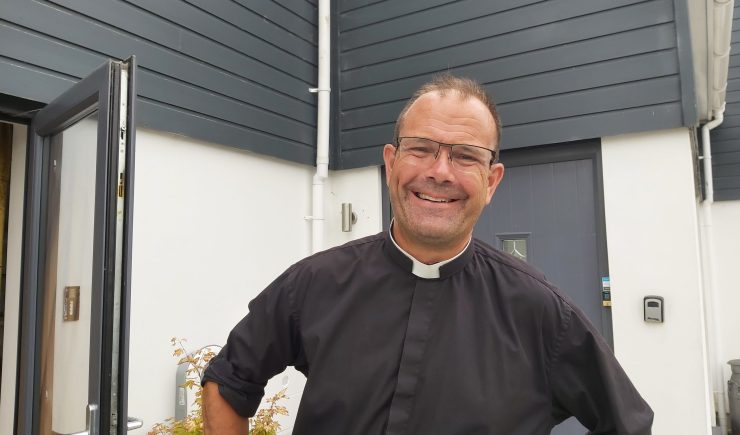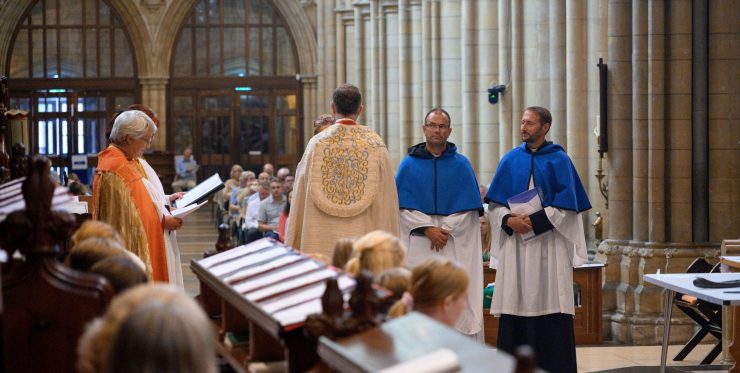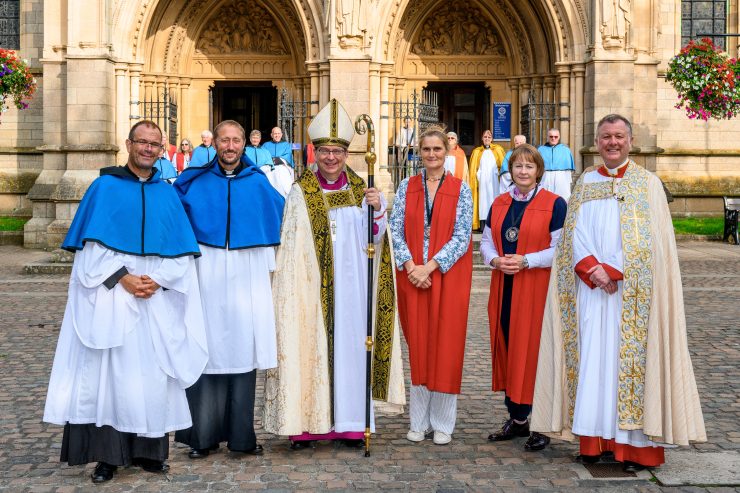A Cornish Canon
The Reverend Canon Chris McQuillen-Wright serves as vicar to the Benefice of Towan Blystra, which includes St Michael the Archangel Church in Newquay, St Colan Church, St Columba Church and St Newlina Church.
On Sunday he was installed as an honorary canon of Truro Cathedral.
He says he was profoundly moved by the special evensong service. “It was quite overwhelming, the support, the words, the enormity of the traditions merged into the mission of the future. Even more humbling than ordination, and that was decades ago!”
Chris was born in Kent, and moved with his family to Cornwall at the age of four.
“But, as my wife says, I’ll never be Cornish,” he laughs.
(His wife is of course Cornish – “generations, through and through!”)
He went to school in St Austell, before studying History at the University of Kent. At that time, he’d thought he was going to become a teacher.
“But I had this nagging feeling that the biggest problem children have is their parents,” he says. “Could I cope with parents whingeing because their child hadn’t been selected for the cross country team? So I asked my local parish priest what a vicar does and whether I’d be any good. I’m still asking myself the same two questions.”
Living in faith
Chris had been raised in a family of faith by Baptist parents who, when he was ten, had quit their church over a point of theology, and they’d become, as he puts it, “a family of high Anglo-Catholics” worshipping in St Austell’s Charlestown. As a teenager, Chris had spent his Sundays attending church both in Charlestown and at the more evangelical Holy Trinity Church in the centre of St Austell.
“I’m therefore a true liberal,” he says. “But I most find the presence of God in the sacramental tradition of Anglo-Catholicism and its passionate conviction to help the poor.”
He’s also particularly passionate in his own liberalism, in his commitment to open-mindedness and tolerance.
“We’re all people,” he insists. “We’re all equal. We all have choices. Sometimes good people make the wrong choices. And sometimes bad people make the wrong choices and get away with them. If we start to judge one another because they’re not the same as us, then we tread a very dangerous road.
“Once we’ve got the basics of everyone being fed sheltered, loved and given hope – once we’ve got all those things right – then we can explore other issues. But, while there are people who are hurting others, manipulating others for their own ends, then the Church has to stand up for what it believes in, and protect the vulnerable, the orphaned and the widowed.”
Chris studied theology at Westcott House in Cambridge. He was the youngest student at the theological college, and went on to spend three years as an ordinand in Truro. He was ordained in 1995 at the tender age of 24, and has served the Church in Cornwall ever since.
He joined team ministries in Hayle and Bodmin, before moving to St Columb Minor at the start of 2002. There he saw his duties grow significantly when, last year, his parish became part of the Benefice of Towan Blystra.
For the love of Cornwall
Though he’s spent most of his life here – and has served the Diocese for more than thirty years – he still doesn’t take Cornwall for granted.
“I feel passionately about Cornwall,” he explains. “I’ve had the opportunity to move elsewhere but there’s something about the rootedness of Cornwall in its natural surroundings – you absorb yourself into its culture and ethos, and you can be embraced whether you were born here or not.
“Your voice can be heard. But if you look to change the culture or manipulate the ethos, then you can’t live a full life with integrity in this place.”
A former Rural Dean of Pydar, he’s currently a member of Diocesan Synod, the Bishop’s Diocesan Council and the Diocesan Vacancy in See Committee, and Chair of the House of Clergy at the Diocese of Truro.
In 2019 he launched “Kerdh” an online faith-based presence. Less than six months later, the country went into lockdown and Kerdh was uniquely placed to be at the forefront of online faith initiatives. As lockdown created its own problems for pastoral care, he developed the “EzraHub”, an online free-to-access self-supporting health and well-being app.
Chris says he feels deeply honoured – and joyfully surprised – to have been made an honorary Canon in the diocese that originally sponsored his training back in 1992.
“I’ve always felt people like me didn’t become honorary canons,” he says. “People like me just carry on doing what we do. We just get on with it. We’re not setting the world alight, we’re just doing what we’re called to do. Sometimes it goes right, sometimes it doesn’t.
“So it was a massive honour to receive the invitation from the Bishop. I’m delighted and honoured to be recognised in this way. I’ve known many previous canons and am following in some truly great footsteps.”



